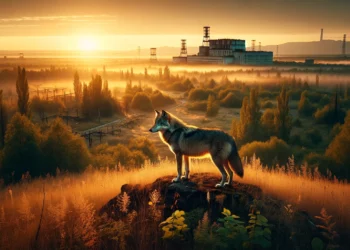
In the city of Laramie, Wyoming, two special groups were trying to solve puzzles. A group of raccoons was trying to solve the puzzles the human researchers had set up for them. Meanwhile, the humans were trying to solve the puzzle of just how smart the raccoons were.
Urban raccoons are often seen rummaging through the trash cans and exploring urban backyards. But is this purely scavenging behavior or does it involve active, intellectual exploration?
Lauren A. Stanton from the University of Wyoming and colleagues believe it’s the latter — and they have the data to prove it. In a new study, the researchers showed that raccoons are flexible problem solvers and innovators.
The city puzzle
A city is, in itself, a type of big puzzle as urbanization presents a set of challenges but also opportunities for wildlife. Essentially, the rapid transformation of natural landscapes into urban environments forces animals to adapt or perish. For dietary generalists like raccoons, the ability to innovate can mean the difference between survival and extinction.
In this context, innovation is defined as the creation of new behaviors or the novel use of existing behaviors. This is important for many animals but is particularly relevant in urban settings where food sources and threats are constantly changing — like cities.
Prior studies have shown that raccoons are curious and highly intelligent. In fact, they’re one of the few species that have excellently adapted to the unfriendly urban ecosystem.
The study was conducted over two years, from August to October 2016 and 2017. The researchers captured and tagged 39 unique raccoons from three different locations in Laramie. Each raccoon’s age, sex, and exploratory behavior were recorded to analyze their problem-solving success.
To assess the problem-solving abilities of raccoons, the researchers designed multi-compartment puzzle boxes containing food rewards. Some of the boxes were simpler and had a single-type solution, while others could be opened in multiple ways. Using radio frequency identification (RFID) tags, the team could track individual raccoons’ interactions with the boxes.
The raccoons displayed remarkable flexibility and individuality in solving the puzzle boxes. Of the 35 raccoons tested with the single-solution puzzle box, eight successfully learned to open the doors, demonstrating significant problem-solving skills. Interestingly, raccoons with higher exploratory diversity during their first trial were more likely to succeed — hinting that raccoons have an incentive to be innovative.
The multi-solution puzzle box presented a more complex challenge, with four different types of latches. Of the 31 raccoons tested, seven successfully solved multiple latch types. Intriguingly, these raccoons did not adhere to a fixed sequence in solving the latches, indicating their ability to adapt and learn different solutions.
Juvenile raccoons, in particular, showed greater exploratory behavior and a higher success rate compared to adults. This supports the “necessity drives innovation” hypothesis, suggesting that younger, less experienced individuals are more willing to experiment and innovate when faced with novel challenges.
Raccoons learn like us
Prior knowledge played a significant role in success. Raccoons that had previously solved the single-solution box tended to opt for more complex solutions when faced with the multi-solution box. This suggests that experience with problem-solving tasks enhances cognitive flexibility and innovation.
“We believe this illustrates how learning begets learning: like us, animals can learn new, basic skills, then build motivation and knowledge that enables them to develop more complex skills,” she explained. “And because we did this study in wild, backyard settings, it gives us an inside scoop on how innovative foraging behaviors develop naturally in urban environments.”
“We think younger raccoons, who are more naive and in poorer body condition, are more likely to take greater risks to survive,” the researcher added.
Understanding the cognitive abilities of urban wildlife can inform conservation and management strategies. By recognizing the innovative potential of species like raccoons, urban planners and wildlife managers can design cities that accommodate and coexist with wildlife. This includes creating green spaces, designing wildlife-friendly infrastructure, and implementing measures to reduce human-wildlife conflicts.
“Our findings serve as a reminder that raccoons and other animals are not going to engage in risky situations if they do not need to,” she said. “So, it’s up to us as people to set humane boundaries with wildlife and make sure that our management strategies are strong from the get-go.”
Specifically, because some raccoons have different problem-solving strategies, different groups living in the same place can be provided with different types of support, avoiding competition for the same resources.
“Naturally occurring variables like age or competition among urban animals haven’t really been considered in this big question of whether cities are making animals ‘smarter,’” she said. “Our study has uncovered important factors that we need to consider when thinking about when and how animals are using their smarts to adapt to city life.”
Journal Reference: Lauren A. Stanton et al, Wild raccoons demonstrate flexibility and individuality in innovative problem-solving, Proceedings of the Royal Society B: Biological Sciences (2024). DOI: 10.1098/rspb.2024.0911






